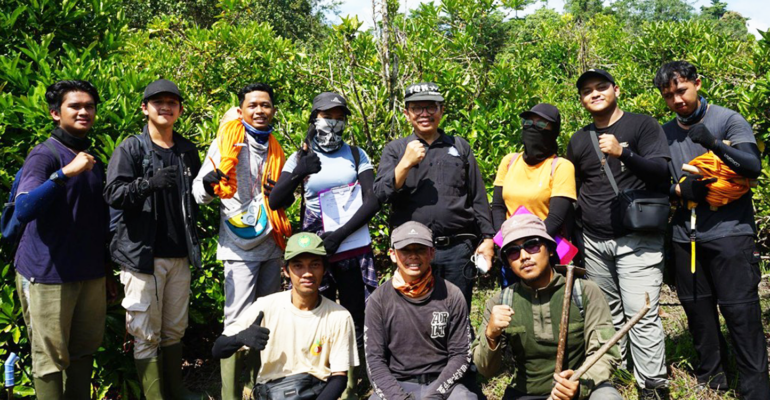IPB University Lecturers Conduct Research and Visit Liberika Coffee Commodities in Podo Rukun Village

IPB University’s collaboration program with the United Nations Environment Program – National Development Planning Agency (UNEP-Bappenas) through The Economics of Ecosystems and Biodiversity for Agriculture and Food Initiative in Indonesia (TEEB Agrifood Indonesia) continues a project that focuses on the coffee sector with a system approach adoption scheme comprehensive, holistic and sustainable food and agriculture.
Prof Nengah Suranti Jaya, Lecturer at the Department of Forest Management, IPB University, conducted a research visit to Podo Rukun Village, Seponti District, North Kayong Regency, West Kalimantan, which is the location for the Liberica coffee (Coffea liberica) commodity selected by TEEB Agrifood Indonesia.
Prof Nengah went directly to the field team’s data collection location at the Liberika coffee plantation owned by farmers in Podo Rukun Village. “The activities carried out during this research visit took the form of sampling data for mapping coffee plantations with agroforestry (AF) and non-agroforestry (Non-AF) systems. “There are 3 coffee plantation locations where mapping data was taken using drones during the visit,” he said.
He continued, that the process of collecting coffee plantation mapping data utilizes drone technology which takes photos and takes videos from a certain height. Prof Nengah revealed that the condition of the coffee plantations in Podo Rukun Village has implemented an agroforestry system using several combinations of fruit plants which are the result of adaptation to Javanese community activities.
“The agroforestry conditions here are quite interesting, bringing with it the Javanese habit of always planting fruit trees behind their houses. “This condition was influenced by the people of Podo Rukun Village who were residents of the transmigration program in 1984,” said Prof Nengah.
Apart from inspecting the coffee plantations, Prof Nengah also had the opportunity to chat with Lika, one of the successful coffee farmers in the village. “Our coffee business was hampered by a drastic drop in prices. “However, now coffee has become a superior commodity in Podo Rukun Village and has been recognized internationally,” said Lika. (*/Lp) (IAAS/ASD)



